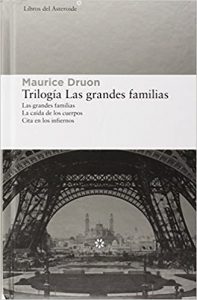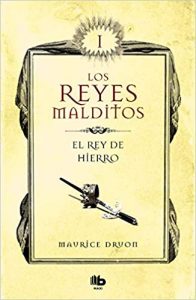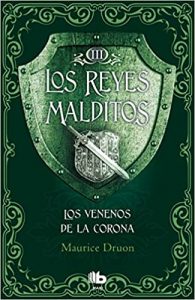Historical fiction finds in Maurice druon to one of its great storytellers in his most balanced aspect between the informative and the fictionalized. Something like a Slav Galán in Spain. As is often the case in these cases, exhaustive documentation and final knowledge usually focus each author on a kind of literary chauvinism that delves into the future of each country.
Only in the end la history of France or Spain (to cite the two great historical nations of the named authors), parallel the future of our world. Even more so with the monarchical custom, as endogamous as it is almost endemic, of perpetuating ties between borders to end up writing a large part of European and world history.
The point is to disseminate and entertain. The mission of a historical fiction novelist is to compensate for what he or she is most interested in exposing in the balance of real events and characters with invention. And then move forward with the plot. Of course, you always have to contribute something interesting, whether from novelty, with different visions or suggestive approaches, or simply because of the degree of detail towards a kind of historical customs that many readers of historical fiction.
As we say, Druon has a lot of informative interest. But also in his bibliography we find those other approaches, very common in history, of invented sagas that serve the cause of perfect molding and adaptation to the time and adventures that are most interesting to narrate.
Top 3 Recommended Novels by Maurice Druon
Big families
One of the best novels of family sagas, with the rhythm of Ken follett but keeping the residue of that other literature of this more purist genre. Both in the historical references and in details that provide various sources to assess a time as turbulent as was the first half of the twentieth century. And a great compilation work that we find in this volume that collects the entire saga.
In 1915 the Schoudler and La Monnerie families were united with the marriage of François and Jacqueline, whose descendants are called to rule the destiny of France; nevertheless, the events will end up contradicting the provisions of fate.
The Trilogy The Great Families is the accurate portrait, public and private, of interwar society; the hitherto dominant classes are dissected in their unambiguous decline, while yielding their position to those who will rule the life of France for decades to come: a gripping tale of ambition and revenge that is also a stylized analysis of power and its mirages.
The iron king
In the end there is always something that magically imbues the story. From the anecdotal or the particular of a king or queen, of a battle or any other transcendent event, the chronicles of other times end up collecting symbols that give another vision of the facts, almost legends, myths that transcend.
And it is true that without that magical vision of things, such as a curse extended for centuries on a throne, some things escape understanding. Even more so if the definitive facts corroborate that we must always trust the fascinating intervention of that imponderable obscurity that enshrines History.
That is the terrible curse that the head of the Templars, from the flames of the bonfire, throws at the face of Philip the Fair, King of France. The year is 1314 and the prophecy seems to have come true: for more than half a century, kings succeed each other on the throne of France, but they never last long. From palace intrigues to sudden and unexplained deaths, from battles between dynasties to disastrous wars, everything seems fatally ruled by the fate of the Cursed Kings.
The poisons of the crown
Some claim that second parts were never good. But if there is a third party, the thing goes back. It's probably a matter of getting used to the natural evolution of a plot rather than getting stuck in a great first part.
The poisons of the crown resurrects the conflicts, hatreds, intrigues and crimes that plagued the eighteen-month reign of Louis X, the Obstinate, perhaps due to his maternal Navarrese roots 😛
The unfortunate fate of the beautiful Clemence of Hungary, called to be Queen of France and suddenly a widow; the truncated destinies of the young Lombard Guccio Baglioni and María Cressay, whose loves had to face social prohibitions; the violent fates of Countess Mahaut de Artois and her nephew Roberto, separated by staunch hatred, and, finally, the tragic fate of King Louis X, who in a few months brings the work of the Iron King to the brink of destruction .
In June 1316, the king died of poison. It is the first time in three centuries that a monarch of France has died without leaving a male heir.



